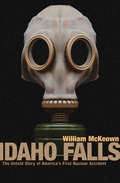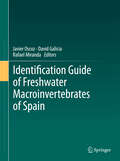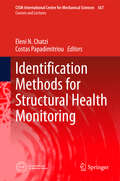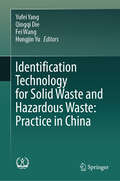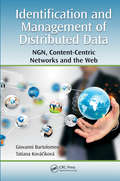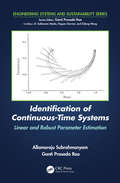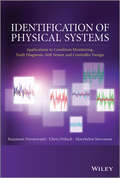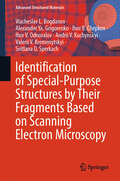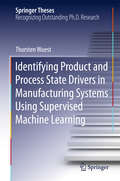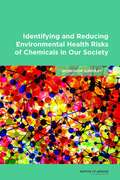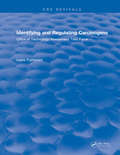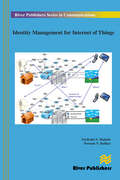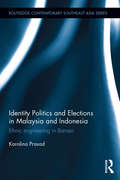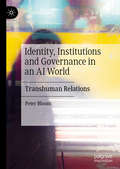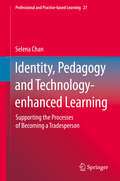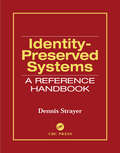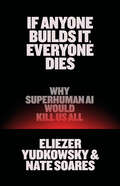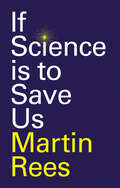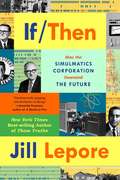- Table View
- List View
Idaho Falls: The Untold Story of America's First Nuclear Accident
by William McKeownThe little-known true story of a mysterious nuclear reactor disaster—years before Three Mile Island, Chernobyl, or Fukushima. Before the Three Mile Island incident or the Chernobyl disaster, the world&’s first nuclear reactor meltdown to claim lives happened on US soil. Chronicled here for the first time is the strange tale of SL-1, an experimental military reactor located in Idaho&’s Lost River Desert that exploded on the night of January 3, 1961, killing the three crewmembers on duty. Through exclusive interviews with the victims&’ families and friends, firsthand accounts from rescue workers and nuclear industry insiders, and extensive research into official documents, journalist William McKeown probes the many questions surrounding this devastating blast that have gone unanswered for decades. From reports of faulty design and mismanagement to incompetent personnel and even rumors of sabotage after a failed love affair, these plausible explanations raise startling new questions about whether the truth was deliberately suppressed to protect the nuclear energy industry.
Ideas for 21st Century Education: Proceedings of the Asian Education Symposium (AES 2016), November 22-23, 2016, Bandung, Indonesia
by Ade Gafar Abdullah Ida Hamidah Siti Aisyah Ari Arifin Danuwijaya Galuh Yuliani Heli S.H. MunawarohIdeas for 21st Century Education contains the papers presented at the Asian Education Symposium (AES 2016), held on November 22—23, 2016, in Bandung, Indonesia. The book covers 11 topics: <P><P>1. Art Education (AED)2. Adult Education (ADE)3. Business Education (BED)4. Course Management (CMT)5. Curriculum, Research and Development (CRD)6. Educational Foundations (EDF)7. Learning / Teaching Methodologies and Assessment (TMA)8. Global Issues in Education and Research (GER)9. Pedagogy (PDG)10. Ubiquitous Learning (UBL)11. Other Areas of Education (OAE)
Identification Guide of Freshwater Macroinvertebrates of Spain
by David Galicia Javier Oscoz Rafael MirandaAs a result of the European Commission's concern for the status of continental waters, and as a clear reflection of the notion of water as heritage to be conserved, in the year 2000 the Water Framework Directive (2000/60/CE) was enacted, its goal being to establish a framework to protect water and the different aquatic ecosystems by requiring the Member States to achieve a good ecological status in all their waters by 2015. Like all ecosystems, freshwater ecosystems undergo physical, chemical and energy-related changes, both of natural and anthropogenic origin. These disturbances affect the organisms living in them and those who utilize their resources. Therefore, evaluating these changes has become a very important task in order to better understand aquatic systems. The study and analysis of the ecological status of these ecosystems in relation to their conservation status and water quality is thus a fundamental tool for a more efficient and rational management of their resources, that is, a management that does not threaten the ecosystem. The present guide for the identification of Spanish freshwater macroinvertebrates aims to facilitate the job of those who go to great lengths to identify them in order to then determine biotic indices. It is not the aim of this book to serve as a zoological treaty, nor does it claim to add new information on the biology or the ecology of the taxa covered. This book is, simply, a working tool explicitly designed to facilitate the identification of the Spanish macroinvertebrates and the subsequent computing of biotic indices.
Identification Methods for Structural Health Monitoring
by Costas Papadimitriou Eleni N. ChatziThe papers in this volume provide an introduction to well known and established system identification methods for structural health monitoring and to more advanced, state-of-the-art tools, able to tackle the challenges associated with actual implementation. Starting with an overview on fundamental methods, introductory concepts are provided on the general framework of time and frequency domain, parametric and non-parametric methods, input-output or output only techniques. Cutting edge tools are introduced including, nonlinear system identification methods; Bayesian tools; and advanced modal identification techniques (such as the Kalman and particle filters, the fast Bayesian FFT method). Advanced computational tools for uncertainty quantification are discussed to provide a link between monitoring and structural integrity assessment. In addition, full scale applications and field deployments that illustrate the workings and effectiveness of the introduced monitoring schemes are demonstrated.
Identification Technology for Solid Waste and Hazardous Waste: Practice in China
by Fei Wang Yufei Yang Qingqi Die Hongjin YuThis book introduces solid and hazardous waste identification technology in environmental management. The author summarizes solid waste and hazardous waste identification research of more than two decades. It includes a series of identification standards, the list of hazardous waste and case studies to broaden the understanding of readers systematically.
Identification and Management of Distributed Data: NGN, Content-Centric Networks and the Web
by Giovanni Bartolomeo Tatiana KovacikovaAlthough several books and academic courses discuss data management and networking, few of them focus on the convergence of networking and software technologies for identifying, addressing, and managing distributed data. Focusing on this convergence, Identification and Management of Distributed Data: NGN, Content-Centric Networks and the Web collat
Identification and Mitigation of Fraudulent Online Transactions Using Authentication and Fraud Detection System (Studies in Smart Technologies)
by Vikrant Bhateja Vipin Khattri Sandeep Kumar Nayak Deepak Kumar SinghThe book explores comprehensive demonstration of the performance analytics following the implementation of the authentication and fraud detection system strategies. These evaluations are based on different performance metrics such as accuracy, true positive rate, true negative rate, precision, g-mean, f1-score and receiver operating characteristic curve. This book highlights effectiveness of the implemented authentication and fraud detection system based on their performance statistics. Additionally, it explores the limitations and social impact of the developed online transaction system, offering insights into potential areas for future research.
Identification and Mitigation of Large Landslide Risks in Europe: Advances in Risk Assessment
by C. Bonnard F. Forlati C. ScaviaLarge landslides affect many mountain valleys in Europe. They are characterised by a low probability of evolution into a catastrophic event but can have very large impacts on population, infrastructures and the environment. This impact is becoming more and more pronounced due to increasing tourism and the construction of new roads and railways in m
Identification of Continuous-Time Systems: Linear and Robust Parameter Estimation (Engineering Systems and Sustainability)
by Allamaraju Subrahmanyam Ganti Prasada RaoModels of dynamical systems are required for various purposes in the field of systems and control. The models are handled either in discrete time (DT) or in continuous time (CT). Physical systems give rise to models only in CT because they are based on physical laws which are invariably in CT. In system identification, indirect methods provide DT models which are then converted into CT. Methods of directly identifying CT models are preferred to the indirect methods for various reasons. The direct methods involve a primary stage of signal processing, followed by a secondary stage of parameter estimation. In the primary stage, the measured signals are processed by a general linear dynamic operation—computational or realized through prefilters, to preserve the system parameters in their native CT form—and the literature is rich on this aspect. In this book: Identification of Continuous-Time Systems-Linear and Robust Parameter Estimation, Allamaraju Subrahmanyam and Ganti Prasada Rao consider CT system models that are linear in their unknown parameters and propose robust methods of estimation. This book complements the existing literature on the identification of CT systems by enhancing the secondary stage through linear and robust estimation. In this book, the authors provide an overview of CT system identification, consider Markov-parameter models and time-moment models as simple linear-in-parameters models for CT system identification, bring them into mainstream model parameterization via basis functions, present a methodology to robustify the recursive least squares algorithm for parameter estimation of linear regression models, suggest a simple off-line error quantification scheme to show that it is possible to quantify error even in the absence of informative priors, and indicate some directions for further research. This modest volume is intended to be a useful addition to the literature on identifying CT systems.
Identification of Physical Systems
by Maryhelen Stevenson Rajamani Doraiswami Chris DiduchIdentification of a physical system deals with the problem of identifying its mathematical model using the measured input and output data. As the physical system is generally complex, nonlinear, and its input-output data is corrupted noise, there are fundamental theoretical and practical issues that need to be considered. Identification of Physical Systems addresses this need, presenting a systematic, unified approach to the problem of physical system identification and its practical applications. Starting with a least-squares method, the authors develop various schemes to address the issues of accuracy, variation in the operating regimes, closed loop, and interconnected subsystems. Also presented is a non-parametric signal or data-based scheme to identify a means to provide a quick macroscopic picture of the system to complement the precise microscopic picture given by the parametric model-based scheme. Finally, a sequential integration of totally different schemes, such as non-parametric, Kalman filter, and parametric model, is developed to meet the speed and accuracy requirement of mission-critical systems. Key features: Provides a clear understanding of theoretical and practical issues in identification and its applications, enabling the reader to grasp a clear understanding of the theory and apply it to practical problems Offers a self-contained guide by including the background necessary to understand this interdisciplinary subject Includes case studies for the application of identification on physical laboratory scale systems, as well as number of illustrative examples throughout the book Identification of Physical Systems is a comprehensive reference for researchers and practitioners working in this field and is also a useful source of information for graduate students in electrical, computer, biomedical, chemical, and mechanical engineering.
Identification of Special-Purpose Structures by Their Fragments Based on Scanning Electron Microscopy (Advanced Structured Materials #233)
by Alexander Ya. Grigorenko Viacheslav L. Bogdanov Ihor B. Chepkov Ihor V. Odnoralov Andrii V. Kuchynskyi Valerii V. Kremenytskyi Svitlana O. SperkachThis book contains previously classified information on the physical and chemical characteristics of metallic and composite materials used in the production of elements of special-purpose structures, and reveals the set of techniques and tools through which this information was obtained. It sets the foundations for the methodology of systematic automated identification of the special-purpose structures by their fragments. The main topics are theoretical foundations and practical results of scanning electron microscopy in determining chemical composition, structure, surface topography and frequency characteristics (reflection and absorption coefficients of electromagnetic waves) of fragments of the structures made of both metal alloys and composite materials. Applied aspects such as the parameters of electromagnetic radiation recommended for effective identification of special-purpose structures made of composite radiation absorbent materials and coatings; development of a scientifically based system for automated identification of the structures by their fragments. The book is aimed at solving the problem to prevent uncontrolled or "gray" transfer of special-purpose products, technologies and materials of military or dual use by forming a scientifically based automatic identification system (by class and country of origin) of special-purpose products by their fragments, using scanning electron microscopy to determine their chemical composition, structure, surface topography, and frequency characteristics. The book is useful to a wide range of specialists in the field of materials science, as well as specialists in the defense sector of industry.
Identifying Product and Process State Drivers in Manufacturing Systems Using Supervised Machine Learning
by Thorsten WuestThe book reports on a novel approach for holistically identifying the relevant state drivers of complex, multi-stage manufacturing systems. This approach is able to utilize complex, diverse and high-dimensional data sets, which often occur in manufacturing applications, and to integrate the important process intra- and interrelations. The approach has been evaluated using three scenarios from different manufacturing domains (aviation, chemical and semiconductor). The results, which are reported in detail in this book, confirmed that it is possible to incorporate implicit process intra- and interrelations on both a process and programme level by applying SVM-based feature ranking. In practice, this method can be used to identify the most important process parameters and state characteristics, the so-called state drivers, of a manufacturing system. Given the increasing availability of data and information, this selection support can be directly utilized in, e. g. , quality monitoring and advanced process control. Importantly, the method is neither limited to specific products, manufacturing processes or systems, nor by specific quality concepts.
Identifying and Reducing Environmental Health Risks of Chemicals in Our Society: Workshop Summary
by Robert PoolOn November 7-8, 2013, the Institute of Medicine's Roundtable on Environmental Health Sciences, Research, and Medicine held a workshop to discuss approaches related to identifying and reducing potential environmental public health risks to new and existing industrial chemicals present in society. Industrial chemicals include chemicals used in industrial processes or commercial products, not including those found in food, pesticides, or pharmaceuticals. Identifying and Reducing Environmental Health Risks of Chemicals in Our Society is a summary and synthesis of the presentations and discussions that took place during the two days of the workshop. The workshop examined successes and areas for improvement within current regulatory programs for assessing industrial chemical safety, frameworks for chemical prioritization to inform targeted testing and risk management strategies, concepts of sustainability and green chemistry that support the design and use of safer alternatives, and efforts to reduce the risk of chemicals in our society.
Identifying and Regulating Carcinogens
by Lewis PublishersThis excellent resource describes the various Federal agency programs, guidelines, laws, and requirements regarding potential exposure to carcinogens in the environment-ambient air, water, and soil-workplace environment-food and drugs and other consumer products. It covers 16 different programs, activities, and Federal agencies. The reader is provided insight into the background and rationale behind current Federal Policy and regulations relating to public health and potential carcinogenic hazards. Necessary differentiation among Hazard Identification, risk characterization, risk assessment, and risk management are clearly described. This guide should prove valuable to scientists, engineers, and managers-companies, governments, universities, and consultants.
Identity Management for Internet of Things (River Publishers Series In Communications Ser.)
by Parikshit N. Mahalle Poonam N. RailkarThe Internet of Things is a wide-reaching network of devices, and these devices can intercommunicate and collaborate with each other to produce variety of services at any time, any place, and in any way. Maintaining access control, authentication and managing the identity of devices while they interact with other devices, services and people is an important challenge for identity management. The identity management presents significant challenges in the current Internet communication. These challenges are exacerbated in the internet of things by the unbound number of devices and expected limitations in constrained resources. Current identity management solutions are mainly concerned with identities that are used by end users, and services to identify themselves in the networked world. However, these identity management solutions are designed by considering that significant resources are available and applicability of these identity management solutions to the resource constrained internet of things needs a thorough analysis. Technical topics discussed in the book include:• Internet of Things;• Identity Management;• Identity models in Internet of Things;• Identity management and trust in the Internet of Things context;• Authentication and access control;Identitymanagement for Internet of Things contributes to the area of identity management for ubiquitous devices in the Internet of Things. It initially presents the motivational factors together with the identity management problems in the context of Internet of Things and proposes an identity management framework. Following this, it refers to the major challenges for Identitymanagement and presents different identity management models. This book also presents relationship between identity and trust, different approaches for trust management, authentication and access control.
Identity Politics and Elections in Malaysia and Indonesia: Ethnic Engineering in Borneo (Routledge Contemporary Southeast Asia Series)
by Karolina PrasadIn recent social research, ethnicity has mostly been used as an explanatory variable. It was only after it was agreed that ethnicity, in itself, is subject to change, were the questions of how and why it changes, possible to answer. This multiplicity of ethnic identities requires that we think of each society as one with multiple ethnic dimensions, of which any can become activated in the process of political competition - and sometimes several of them within a short period of time. Focusing on Malaysia and Indonesia, this book traces the variations of ethnic identity by looking at electoral strategies in two sub-national units. It shows that ethnic identities are subject to change - induced by calculated moves by political entrepreneurs who use identities as tools to maximize their chances of winning elections or expanding support base - and highlights how political institutions play an enormous role in shaping the modes and dynamics of these ethno-political manipulations. The book suggests that in societies where ethnic identities are activated in politics, instead of analysing politics with ethnic distribution as an independent variable, ethnic distribution can be taken as the dependent variable, with political institutions being the explanatory one. It examines the problems of voters’ behaviour, and parties’ and candidates’ strategy in a polity that is, to a significant extent, driven by ethnic relations. Pushing the boundaries of qualitative research on Southeast Asian politics by placing formal institutions at the centre of its analysis, this book will be of interest to students and scholars of Southeast Asian Politics, Race and Ethnic Studies, and International Relations.
Identity, Institutions and Governance in an AI World: Transhuman Relations
by Peter BloomThe 21st century is on the verge of a possible total economic and political revolution. Technological advances in robotics, computing and digital communications have the potential to completely transform how people live and work. Even more radically, humans will soon be interacting with artificial intelligence (A.I.) as a normal and essential part of their daily existence. What is needed now more than ever is to rethink social relations to meet the challenges of this soon-to-arrive "smart" world. This book proposes an original theory of trans-human relations for this coming future. Drawing on insights from organisational studies, critical theory, psychology and futurism - it will chart for readers the coming changes to identity, institutions and governance in a world populated by intelligent human and non-human actors alike. It will be characterised by a fresh emphasis on infusing programming with values of social justice, protecting the rights and views of all forms of "consciousness" and creating the structures and practices necessary for encouraging a culture of "mutual intelligent design". To do so means moving beyond our anthropocentric worldview of today and expanding our assumptions about the state of tomorrow's politics, institutions, laws and even everyday existence. Critically such a profound shift demands transcending humanist paradigms of a world created for and by humans and instead opening ourselves to a new reality where non-human intelligence and cyborgs are increasingly central.
Identity, Pedagogy and Technology-enhanced Learning: Supporting the Processes of Becoming a Tradesperson (Professional and Practice-based Learning #27)
by Selena ChanThis book gathers work from over a decade of study, and seeks to better understand and support how learners become tradespeople. The research programme applies recent concepts from neuroscience, educational psychology and technology-enhanced learning to explain and help overcome the challenges of learning in trades-learning contexts. Due to the complex and multifarious nature of the work characterising trade occupations, learning how to become a tradesperson requires a significant commitment in terms of time, along with physical and cognitive effort. All modalities (visual, aural, haptic etc.) and literacies (text, numerical, spatial etc.) are required when undertaking trade work. Manual dexterity and strength, coupled with the technical and tacit knowledge required for complex problem solving, not to mention suitable dispositional approaches, must all be learnt and focused on becoming a tradesperson.However, there is a substantial gap in the literature on 'how people learn a trade' and 'how to teach a trade'. In this book, contemporary teaching and learning approaches and strategies, as derived through practice-based participatory research, are used to highlight and discuss pragmatic solutions to facilitate the learning and teaching of trade skills, knowledge and dispositions. The approaches and strategies discussed include the implementation of technology-enhanced learning; project-based inquiry/problem-based learning; and recommendations to ensure learners are prepared for the future of work.
Identity-Preserved Systems: A Reference Handbook
by Dennis StrayerIdentity-Preserved Systems: A Reference Handbook provides background for the development of processes or systems of maintaining the segregation of and documenting the identity of a product. Growers and other parties that handle, transport, condition, or process the identity-preserved (IP) product must follow strict growing and handling practices, i
If Anyone Builds It, Everyone Dies: Why Superhuman AI Would Kill Us All
by Eliezer Yudkowsky Nate SoaresThe scramble to create superhuman AI has put us on the path to extinction—but it’s not too late to change course, as two of the field’s earliest researchers explain in this clarion call for humanity. <P><P> "May prove to be the most important book of our time.”—Tim Urban, Wait But Why. <P><P> In 2023, hundreds of AI luminaries signed an open letter warning that artificial intelligence poses a serious risk of human extinction. Since then, the AI race has only intensified. Companies and countries are rushing to build machines that will be smarter than any person. And the world is devastatingly unprepared for what would come next. For decades, two signatories of that letter—Eliezer Yudkowsky and Nate Soares—have studied how smarter-than-human intelligences will think, behave, and pursue their objectives. Their research says that sufficiently smart AIs will develop goals of their own that put them in conflict with us—and that if it comes to conflict, an artificial superintelligence would crush us. The contest wouldn’t even be close. <P><P> How could a machine superintelligence wipe out our entire species? Why would it want to? Would it want anything at all? In this urgent book, Yudkowsky and Soares walk through the theory and the evidence, present one possible extinction scenario, and explain what it would take for humanity to survive. The world is racing to build something truly new under the sun. And if anyone builds it, everyone dies. <P><P> “The best no-nonsense, simple explanation of the AI risk problem I've ever read.”—Yishan Wong, Former CEO of Reddit. <P><P> <B>New York Times Bestseller</B>
If I Built a Car
by Chris Van Dusen"If I built a car, it'd be totally new! Here are a few of the things that I'd do. . . . " Jack has designed the ultimate fantasy car. Inspired by zeppelins and trains, Cadillacs and old planes, with brilliant colors and lots of shiny chrome, this far-out vision is ready to cruise! there's a fireplace, a pool, and even a snack bar! After a tour of the ritzy interior, robert the robot starts up the motor . . . and Jack and his dad set off on the wildest test drive ever!
If I Built a Car (If I Built Series)
by Chris Van DusenIf I built a car, it'd be totally new!Here are a few of the things that I'd do. . . .Young Jack is giving an eye-opening tour of the car he'd like to build. There's a snack bar, a pool, and even a robot named Robert to act as chauffeur. With Jack's soaring imagination in the driver's seat, we're deep-sea diving one minute and flying high above traffic the next in this whimsical, tantalizing take on the car of the future. Illustrations packed with witty detail, bright colors, and chrome recall the fabulous fifties and an era of classic American automobiles. Infectious rhythm and clever invention make this wonderful read-aloud a launch pad for imaginative fun.
If Science is to Save Us
by Martin ReesThere has never been a time when &‘following the science&’ has been more important for humanity. At no other point in history have we had such advanced knowledge and technology at our fingertips, nor had such astonishing capacity to determine the future of our planet. But the decisions we must make on how science is applied belong outside the lab and should be the outcome of wide public debate. For that to happen, science needs to become part of our common culture. Science is not just for scientists: if it were, it could never save us from the multiple crises we face. For science can save us, if its innovations mesh carefully into society and its applications are channelled for the common good. As Martin Rees argues in this expert and personal analysis of the scientific endeavour on which we all depend, we need to think globally, we need to think rationally and we need to think long-term, empowered by twenty-first-century technology but guided by values that science alone cannot provide.
If Then: How Simulmatics Corporation Invented The Future
by Jill LeporeLonglisted • Financial Times & McKinsey Business Book of the Year A revelatory account of the Cold War origins of the data-mad, algorithmic twenty-first century, from the author of the acclaimed international bestseller These Truths. The Simulmatics Corporation, launched during the Cold War, mined data, targeted voters, manipulated consumers, destabilized politics, and disordered knowledge—decades before Facebook, Google, and Cambridge Analytica. Jill Lepore, best-selling author of These Truths, came across the company’s papers in MIT’s archives and set out to tell this forgotten history, the long-lost backstory to the methods, and the arrogance, of Silicon Valley. Founded in 1959 by some of the nation’s leading social scientists—“the best and the brightest, fatally brilliant, Icaruses with wings of feathers and wax, flying to the sun”—Simulmatics proposed to predict and manipulate the future by way of the computer simulation of human behavior. In summers, with their wives and children in tow, the company’s scientists met on the beach in Long Island under a geodesic, honeycombed dome, where they built a “People Machine” that aimed to model everything from buying a dishwasher to counterinsurgency to casting a vote. Deploying their “People Machine” from New York, Washington, Cambridge, and even Saigon, Simulmatics’ clients included the John F. Kennedy presidential campaign, the New York Times, the Department of Defense, and dozens of major manufacturers: Simulmatics had a hand in everything from political races to the Vietnam War to the Johnson administration’s ill-fated attempt to predict race riots. The company’s collapse was almost as rapid as its ascent, a collapse that involved failed marriages, a suspicious death, and bankruptcy. Exposed for false claims, and even accused of war crimes, it closed its doors in 1970 and all but vanished. Until Lepore came across the records of its remains. The scientists of Simulmatics believed they had invented “the A-bomb of the social sciences.” They did not predict that it would take decades to detonate, like a long-buried grenade. But, in the early years of the twenty-first century, that bomb did detonate, creating a world in which corporations collect data and model behavior and target messages about the most ordinary of decisions, leaving people all over the world, long before the global pandemic, crushed by feelings of helplessness. This history has a past; If Then is its cautionary tale.
If You Decide to Go to the Moon
by Steven Kellogg Faith McNulty"If you decide to go to the moon," writes Faith McNulty, "read this book first. It will tell you how to get there and what to do after you land. The most important part tells you how to get home." Written in the second person, the text allows the reader to participate in every aspect of the journey, from packing ("don't forget your diary and plenty of food") to liftoff (at first you'll feel heavy; don't worry") to traveling through space (where "the moon glows like a pearl in the black, black sky"). The reader lands at the Sea of Tranquility, the site of the first lunar landing
